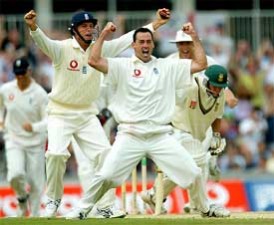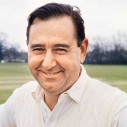The Six who came in from the Cold
David Taylor |
2003 was an interesting year to follow cricket, especially in England. It was a World Cup year of course, and the England team faced a dilemma about playing in Zimbabwe; it was the first year of the domestic Twenty20 competition, complete with all manner of off-field entertainments (although the last few summers, sad to tell, have seen little in the way of jacuzzi weather, and I gather Atomic Kitten are no longer still going); it saw the handover of the England Test captaincy from Nasser Hussain to Michael Vaughan, who was already in charge of the one-day side; Sussex won their first Championship; and it was the fourth year of central contracts, which had been introduced in 2000 in an attempt to arrest England’s dismal slide down the world rankings. By and large the central contract system has worked well, and I’m sure that England’s players are grateful not to have to go off and play a county game the day after a Test match finishes, but if there has been a regular criticism it is that it’s made the England team rather a cosy club, that it’s as difficult to get dropped as it is to get in (remember how many times Ian Bell failed in 2008-09 before the selectors lost patience; his replacement Owais Shah had nothing like as many chances), and that the selectors rarely look outside the contracted list to see who is performing in county cricket and might do better than the select few.
Not so in 2003. With their hands forced, to a large degree, by injury, but also showing a refreshing and uncommon awareness of what was happening in county cricket, David Graveney and his colleagues selected six uncontracted players to represent England in the summer’s Tests against Zimbabwe and South Africa. In fact it was seven, because James Anderson made his debut in the first Test against Zimbabwe at Lord’s, but the Burnley boy had of course appeared in one-day internationals in Australia, and in the World Cup which followed; his debut was one of the most inevitable of recent years, although his five-wicket haul in the first innings represented a success rate that he struggled to maintain for a long time.
Enough of Anderson – the career of the most recent Englishman to the landmark of 300 wickets will be profiled elsewhere. His fellow debutant in that Lord’s Test, in which the visitors were comfortably overcome by an innings and 92 runs, was from the other side of the Pennines. Anthony McGrath distinguished himself with bat and ball, first making 69, the second highest score after Mark Butcher’s century which earned him the match award. When Zimbabwe batted his medium-paced bowling was not required in the first innings, but with the visitors showing more resolve after following on – opening bowlers Anderson and Matthew Hoggard both going wicketless – Butcher and McGrath were the unlikely destroyers. The Surrey man took his second four-wicket haul in Tests, while McGrath, who’d been on England’s radar for a while, having toured with the A team as early as 1995-96, took out the middle order of Taibu, Ervine and Streak to finish with three for 16.
The second Test was played at Chester-le-Street, England’s first new venue since the ill-fated Sheffield ground in 1902. Hoggard was absent with a knee injury – in fact, his England cricket was already over for the season – and in his place came Richard Johnson of Middlesex, another who England had first considered many years earlier. The 28-year-old Johnson had been picked for the tour of South Africa in 1995-96, only to have to pull out unfit. A few years before that Ricky Ellcock had withdrawn from a winter tour and was never picked again. Johnson had his chance now, and like McGrath in the previous match, made it count. In fact he first enjoyed himself with the bat – with England running up a total of 416 without an individual hundred Johnson hit a cheery 24 off only 21 balls. But his main business came when he was handed the new ball with Anderson, preferred to local hero Steve Harmison. In only 32 overs – the equivalent of just over a single session – the tourists were bundled out for 94, seven of them falling lbw, a mode of dismissal that accounted for five of Johnson’s six wickets for 33. Well as he bowled, the absence from the Zimbabwe line-up of Andy Flower, Murray Goodwin and Neil Johnson made them a far weaker batting unit than on their previous tour three years before. In the second innings Anderson and Harmison (had any England attack, observers wondered, featured three ‘sons’ before?) did most of the damage; McGrath, who’d top-scored with 81, wasn’t needed this time.
The six day series was followed by three one-day matches against Pakistan and a triangular event with Zimbabwe and the summer’s other tourists, South Africa, before the main business of the international summer began with the first Test against Graeme Smith’s men at Edgbaston. If England, who awarded no new caps but recalled Darren Gough to share the new ball with Anderson, were under any illusions about the task ahead they were disabused of them by the close of the first day, with South Africa on 398 for 1. The captain and Herschelle Gibbs had put on 338, both making big hundreds, and Smith went on to a national record score of 277 on Saturday, after a day lost to rain. The time taken out of the game meant that Smith declared earlier than he would have liked, on 594 for 5, and England saved the follow-on, and with it the match, with 156 from Vaughan, the heir apparent who found himself England’s Test captain when Hussain resigned immediately after the match. Incidentally, this was the first occasion on which ‘Jerusalem’ was played before the start of play.
The home side was again outplayed at Lord’s, and this time there was no escape. England were bowled out for an inadequate 173, Ntini taking five wickets (and ten in the match) and their attack was impotent as South Africa ran up a huge lead of 509, while losing only six wickets. McGrath, who curiously hadn’t been tried at Edgbaston, did as well as anyone taking the wicket of Kirsten, and also kept wicket after an injury to Alec Stewart. But scores of 4 and 13 spelled the end of his brief Test career; another to bow out was Gough, who deserved a better send-off than 0 for 127. Rising star Andrew Flintoff enlivened the closing stages with a rousing innings of 142.
After such a lamentable display there were calls for fresh faces in the third Test at Trent Bridge and two made the XI: Ed Smith was in tremendous form for Kent, the first batsman in the country to 1000 first-class runs – he would later tell the story of his memorable season in the excellent ‘On and Off the Field.’ Opening bowler James Kirtley had first been involved in an England game in 1996 in Zimbabwe, although he was playing for the opposition then. England won the toss and, after losing both openers cheaply, controlled the game. Hundreds from Butcher and Hussain, well supported by Smith and Stewart, saw them to 445, then Anderson, who’d struggled in the first two Tests, rediscovered his mojo with five wickets. England collapsed in the second innings, Smith following his first-innings 64 with a first-ball duck, but by then the wicket had become difficult and Kirtley blew the tourists away with 6 for 34, the best figures by a debutant at Trent Bridge. He had spent time out of the game having to remodel his action, and may have despaired of ever attaining international honours. His dismissal of the prolific Smith for 5 in the second innings was a critical blow that sent England on their way.
So the series was level with two to play. At Headingley England, not for the first or last time, played no specialist spinner. Harmison was ruled out as well so in came two more from the counties, one making his debut, the other returning after ten years. Worcestershire’s Kabir Ali was 22, and had appeared in the one-day matches earlier in the season. Martin Bicknell of Surrey was returning after missing a world-record 114 Tests, having supposedly been close to selection against Australia in 2001. Anderson and Flintoff were still in the side, but at the start of the season you could have got good odds on Kirtley, Kabir and Bicknell appearing together in an England attack. The home side had chances to go ahead in the series but South Africa, minus Shaun Pollock who was on paternity leave, got out of jail when Gary Kirsten and Monde Zondeki added 150 for the eighth wicket. In the second innings Andrew Hall lashed 99 not out to put the match beyond England’s reach. Kabir took five wickets in the match but went at four an over, while Bicknell started well but visibly tired later in the game.
The final Test at the Oval was one of the best of recent times. It was the farewell for ‘the Gaffer’ Alec Stewart, England’s most-capped player, and saw a recall for another local hero, Graham Thorpe, who had withdrawn from the winter’s Ashes tour with personal issues. England’s series-levelling win represented a stunning comeback. Shortly before the close on day one South Africa, who of course only needed a draw, were 345 for 2. Yet England clawed their way back into the game, 219 from Marcus Trescothick, an emotional hundred from Thorpe and a quickfire 95 from Flintoff securing a lead of 120 before Harmison and Bicknell, with four wickets apiece, made inroads into the tourists’ batting. The final target of 110 was achieved without alarms, allowing Stewart to leave Test cricket on a winning note after playing on the losing side more often than any England player.
And what became of the six ‘outsiders’?
Anthony McGrath continued to play in ODIs for another year, and retired in 2012 after a 17-year career.
Richard Johnson played two more Tests on England’s winter tour of Bangladesh and Sri Lanka, before ending his career at Somerset.
Ed Smith went to Middlesex as captain, but, troubled by injuries retired aged 31 to concentrate on a career in the media.
James Kirtley helped Sussex to two more titles before retiring in 2010, and now runs a sportswear company.
Kabir Ali is the only one of the six still playing – he’s at Lancashire, his third county. He played more ODIs for England, but never added to his sole Test cap.
Martin Bicknell took his 1000th wicket in 2004 – since the reduction of first-class cricket in 1969 no English bowler has achieved that tally while playing so few Tests – and is now on the Surrey coaching staff.





The best thing I remember about that series was Martin Bicknell’s delicious set-up of Jacques Rudolph at (I think) the Oval test.
3 away swingers set up Rudolph to leave the fourth alone. Bang – inswinger hits the top of off. Or at least that’s how I remember it.
Anyone happen to have seen that particular wicket on You Tube anywhere?
Comment by HeathDavisSpeed | 12:00am BST 24 May 2013
Good article, 2003 was the first summer where I made an effort to sit down and follow Test cricket, hence my love for Jimmeh.
Flintoff’s batting that summer was awesome.
Comment by GingerFurball | 12:00am BST 25 May 2013
Very interesting article, but the author missed a trick.
“James Kirtley helped Sussex to two more titles before retiring in 2010, and now runs a sportswear company.”
I wouldn’t have used ‘retiring’ – I would have said ‘chucked it in’. Then again, I would probably have been sued.
Comment by luckyeddie | 12:00am BST 28 May 2013